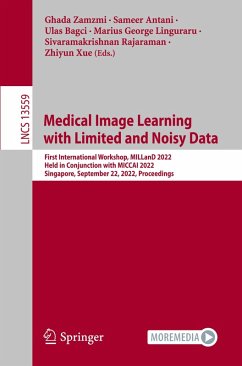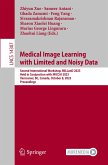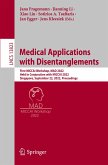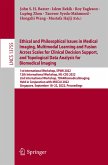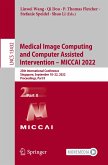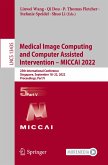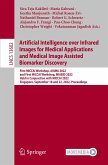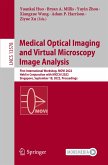Medical Image Learning with Limited and Noisy Data
First International Workshop, MILLanD 2022, Held in Conjunction with MICCAI 2022, Singapore, September 22, 2022, Proceedings
Herausgegeben:Zamzmi, Ghada; Antani, Sameer; Bagci, Ulas; Linguraru, Marius George; Rajaraman, Sivaramakrishnan; Xue, Zhiyun
Medical Image Learning with Limited and Noisy Data
First International Workshop, MILLanD 2022, Held in Conjunction with MICCAI 2022, Singapore, September 22, 2022, Proceedings
Herausgegeben:Zamzmi, Ghada; Antani, Sameer; Bagci, Ulas; Linguraru, Marius George; Rajaraman, Sivaramakrishnan; Xue, Zhiyun
- Broschiertes Buch
- Merkliste
- Auf die Merkliste
- Bewerten Bewerten
- Teilen
- Produkt teilen
- Produkterinnerung
- Produkterinnerung
This book constitutes the proceedings of the First Workshop on Medical Image Learning with Limited and Noisy Data, MILLanD 2022, held in conjunction with MICCAI 2022. The conference was held in Singapore. For this workshop, 22 papers from 54 submissions were accepted for publication. They selected papers focus on the challenges and limitations of current deep learning methods applied to limited and noisy medical data and present new methods for training models using such imperfect data.
Andere Kunden interessierten sich auch für
![Medical Image Learning with Limited and Noisy Data Medical Image Learning with Limited and Noisy Data]() Medical Image Learning with Limited and Noisy Data85,99 €
Medical Image Learning with Limited and Noisy Data85,99 €![Medical Applications with Disentanglements Medical Applications with Disentanglements]() Medical Applications with Disentanglements43,99 €
Medical Applications with Disentanglements43,99 €![Ethical and Philosophical Issues in Medical Imaging, Multimodal Learning and Fusion Across Scales for Clinical Decision Support, and Topological Data Analysis for Biomedical Imaging Ethical and Philosophical Issues in Medical Imaging, Multimodal Learning and Fusion Across Scales for Clinical Decision Support, and Topological Data Analysis for Biomedical Imaging]() Ethical and Philosophical Issues in Medical Imaging, Multimodal Learning and Fusion Across Scales for Clinical Decision Support, and Topological Data Analysis for Biomedical Imaging43,99 €
Ethical and Philosophical Issues in Medical Imaging, Multimodal Learning and Fusion Across Scales for Clinical Decision Support, and Topological Data Analysis for Biomedical Imaging43,99 €![Medical Image Computing and Computer Assisted Intervention ¿ MICCAI 2022 Medical Image Computing and Computer Assisted Intervention ¿ MICCAI 2022]() Medical Image Computing and Computer Assisted Intervention ¿ MICCAI 202239,99 €
Medical Image Computing and Computer Assisted Intervention ¿ MICCAI 202239,99 €![Medical Image Computing and Computer Assisted Intervention ¿ MICCAI 2022 Medical Image Computing and Computer Assisted Intervention ¿ MICCAI 2022]() Medical Image Computing and Computer Assisted Intervention ¿ MICCAI 202239,99 €
Medical Image Computing and Computer Assisted Intervention ¿ MICCAI 202239,99 €![Artificial Intelligence over Infrared Images for Medical Applications and Medical Image Assisted Biomarker Discovery Artificial Intelligence over Infrared Images for Medical Applications and Medical Image Assisted Biomarker Discovery]() Artificial Intelligence over Infrared Images for Medical Applications and Medical Image Assisted Biomarker Discovery43,99 €
Artificial Intelligence over Infrared Images for Medical Applications and Medical Image Assisted Biomarker Discovery43,99 €![Medical Optical Imaging and Virtual Microscopy Image Analysis Medical Optical Imaging and Virtual Microscopy Image Analysis]() Medical Optical Imaging and Virtual Microscopy Image Analysis43,99 €
Medical Optical Imaging and Virtual Microscopy Image Analysis43,99 €-
-
-
This book constitutes the proceedings of the First Workshop on Medical Image Learning with Limited and Noisy Data, MILLanD 2022, held in conjunction with MICCAI 2022. The conference was held in Singapore. For this workshop, 22 papers from 54 submissions were accepted for publication. They selected papers focus on the challenges and limitations of current deep learning methods applied to limited and noisy medical data and present new methods for training models using such imperfect data.
Produktdetails
- Produktdetails
- Lecture Notes in Computer Science 13559
- Verlag: Springer / Springer Nature Switzerland / Springer, Berlin
- Artikelnr. des Verlages: 978-3-031-16759-1
- 1st ed. 2022
- Seitenzahl: 252
- Erscheinungstermin: 22. September 2022
- Englisch
- Abmessung: 235mm x 155mm x 14mm
- Gewicht: 388g
- ISBN-13: 9783031167591
- ISBN-10: 3031167597
- Artikelnr.: 64996789
- Herstellerkennzeichnung Die Herstellerinformationen sind derzeit nicht verfügbar.
- Lecture Notes in Computer Science 13559
- Verlag: Springer / Springer Nature Switzerland / Springer, Berlin
- Artikelnr. des Verlages: 978-3-031-16759-1
- 1st ed. 2022
- Seitenzahl: 252
- Erscheinungstermin: 22. September 2022
- Englisch
- Abmessung: 235mm x 155mm x 14mm
- Gewicht: 388g
- ISBN-13: 9783031167591
- ISBN-10: 3031167597
- Artikelnr.: 64996789
- Herstellerkennzeichnung Die Herstellerinformationen sind derzeit nicht verfügbar.
Efficient and Robust Annotation Strategies.- Heatmap Regression for Lesion Detection using Pointwise Annotations.-.- Partial Annotations for the Segmentation of Large Structures with Low Annotation.-.- Abstraction in Pixel-wise Noisy Annotations Can Guide Attention to Improve Prostate Cancer Grade Assessment.- Meta Pixel Loss Correction for Medical Image Segmentation with Noisy Labels.- Re-thinking and Re-labeling LIDC-IDRI for Robust Pulmonary Cancer Prediction.- Weakly-supervised, Self-supervised, and Contrastive Learning.- Universal Lesion Detection and Classification using Limited Data and Weakly-Supervised Self-Training.- BoxShrink: From Bounding Boxes to Segmentation Masks.- Multi-Feature Vision Transformer via Self-Supervised Representation Learning for Improvement of COVID-19 Diagnosis.- SB-SSL: Slice-Based Self-Supervised Transformers for Knee Abnormality Classification from MRI.- Optimizing Transformations for Contrastive Learning in a Differentiable Framework.-Stain-based Contrastive Co-training for Histopathological Image Analysis.- Active and Continual Learning.- CLINICAL: Targeted Active Learning for Imbalanced Medical Image Classification.- Real-time Data Augmentation using Fractional Linear Transformations in Continual Learning.- DIAGNOSE: Avoiding Out-of-distribution Data using Submodular Information Measures.- Transfer Representation Learning.- Auto-segmentation of Hip Joints using MultiPlanar UNet with Transfer learning.- Asymmetry and Architectural Distortion Detection with Limited Mammography Data.- Imbalanced Data and Out-of-distribution Generalization.- Class Imbalance Correction for Improved Universal Lesion Detection and Tagging in CT.- CVAD: An Anomaly Detector for Medical Images Based on Cascade.- Approaches for Noisy, Missing, and Low Quality Data.- Visual Field Prediction with Missing and Noisy Data Based on Distance-based Loss.- Image Quality Classification for Automated Visual Evaluation of Cervical Precancer.- A Monotonicity Constraint Attention Module for Emotion Classification with Limited EEG Data.- Automated Skin Biopsy Analysis with Limited Data.
Efficient and Robust Annotation Strategies.- Heatmap Regression for Lesion Detection using Pointwise Annotations.-.- Partial Annotations for the Segmentation of Large Structures with Low Annotation.-.- Abstraction in Pixel-wise Noisy Annotations Can Guide Attention to Improve Prostate Cancer Grade Assessment.- Meta Pixel Loss Correction for Medical Image Segmentation with Noisy Labels.- Re-thinking and Re-labeling LIDC-IDRI for Robust Pulmonary Cancer Prediction.- Weakly-supervised, Self-supervised, and Contrastive Learning.- Universal Lesion Detection and Classification using Limited Data and Weakly-Supervised Self-Training.- BoxShrink: From Bounding Boxes to Segmentation Masks.- Multi-Feature Vision Transformer via Self-Supervised Representation Learning for Improvement of COVID-19 Diagnosis.- SB-SSL: Slice-Based Self-Supervised Transformers for Knee Abnormality Classification from MRI.- Optimizing Transformations for Contrastive Learning in a Differentiable Framework.-Stain-based Contrastive Co-training for Histopathological Image Analysis.- Active and Continual Learning.- CLINICAL: Targeted Active Learning for Imbalanced Medical Image Classification.- Real-time Data Augmentation using Fractional Linear Transformations in Continual Learning.- DIAGNOSE: Avoiding Out-of-distribution Data using Submodular Information Measures.- Transfer Representation Learning.- Auto-segmentation of Hip Joints using MultiPlanar UNet with Transfer learning.- Asymmetry and Architectural Distortion Detection with Limited Mammography Data.- Imbalanced Data and Out-of-distribution Generalization.- Class Imbalance Correction for Improved Universal Lesion Detection and Tagging in CT.- CVAD: An Anomaly Detector for Medical Images Based on Cascade.- Approaches for Noisy, Missing, and Low Quality Data.- Visual Field Prediction with Missing and Noisy Data Based on Distance-based Loss.- Image Quality Classification for Automated Visual Evaluation of Cervical Precancer.- A Monotonicity Constraint Attention Module for Emotion Classification with Limited EEG Data.- Automated Skin Biopsy Analysis with Limited Data.

